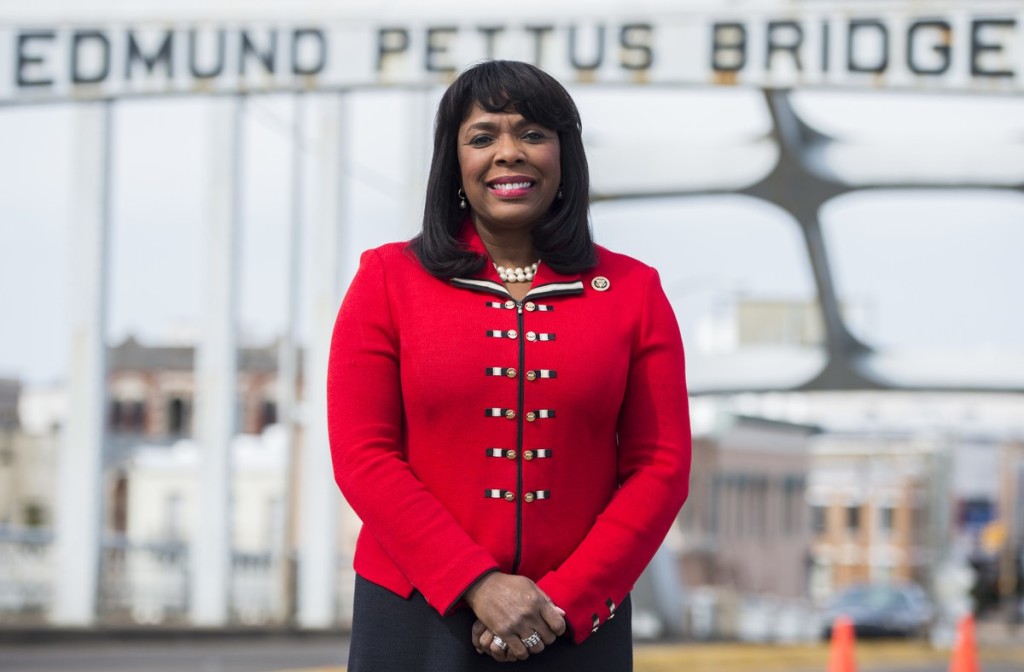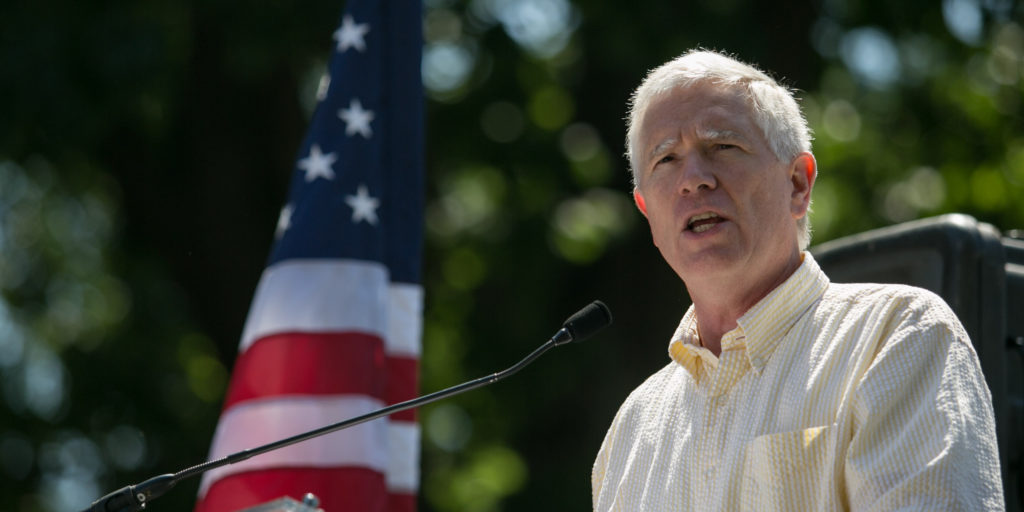Jim Zeigler to Donald Trump: mandate public hangings in SOTU speech

When President Donald Trump speaks before a joint session on Congress on Tuesday evening, Alabama State Auditor Jim Zeigler wants him to propose legislation that would mandate public hangings for all convicted cop killers. On Monday, Zeigler e-mailed a letter to Trump and to his own “inside contacts in the Trump administration” making the request which follows the killings of ten law enforcement officers nationally, with two in Alabama, in just the first month of 2019. “It would be more of a deterrent to the killing of officers if would-be killers witnessed others hanging in the public square. Nothing else makes them think. Maybe hanging would,” Zeigler explained. He continued, “We need an ‘express lane’ for executions such as Texas has – maybe stronger. We need to stop these 20- to 30-year delays in executions at taxpayer expense. Justice delayed is justice denied. These potential killers are not deterred by what may happen to them in 30 years. They are thinking of instant gratification in the next 30 minutes – or 30 seconds.” Zeigler believes he’s on the same page as Trump on this issue. In a May 17 ceremony honoring fallen officers, Trump said: “We’re not going to let bad things happen to our police. We believe criminals who kill our police should get the death penalty.” Nevertheless, Congress has yet to consider, much less pass, legislation on the death penalty for cop killers, and Zeigler says it should be a priority in the 116th Congress. Federal law already has the death penalty for murdering a law enforcement office, if the officer was assisting in a federal investigation. Zeigler wants to see that expanded to include any law enforcement officer, which he says could be achieved with a one sentence amendment to 18 U.S. Code § 1121. Read Zeigler’s letter to Trump below:
Terri Sewell says she is ‘biased’ towards sorority sister Kamala Harris

Hoping for support in their bid for the 2020 Democratic nomination, both New Jersey senator Cory Booker and Kamala Harris, a senator from California, have been campaigning heavily among the Congressional Black Caucus (CBC). Alabama 7th District U.S. Rep. Terri Sewell has admitted she is “biased” towards Harris, as they were both members of the same African-American sorority, Alpha Kappa Alpha, The Hill reports. However, she hasn’t ruled out supporting Booker. “I think it’s awesome we have so many amazing choices,” Sewell said. Last year, when Harris spoke at the 25th Annual Selma Bridge Crossing Jubilee commemorating the 53rd anniversary of the Selma-to-Montgomery March, she spoke of Sewell. She said that those who originally marched “laid the foundation so that John Lewis and Terri Sewell and Barbara Lee can serve in the United States Congress. To carry on the work.” Sewell, Alabama’s first black Congresswoman, has previously said that black women are crucial to Democratic success. When Senator Doug Jones won the special election in 2018, she told the Chicago Sun-Times that black women had been “the backbone of the Democratic Party for a long time and we’re finally getting our due, There were a whole bunch of people he doesn’t even know that did a whole bunch of work to help him get there.” Another “rising political star” bringing black women together is Stacey Abrams, who will be delivering the Democratic response to Donald Trump‘s upcoming State of the Union Address. Sewell shared her excitement about this choice on Facebook, saying “Stacey Abrams reflects our party’s shared values of equality and inclusion and is a brilliant choice to give the democratic response to the State of the Union.”
State of the Union among most sensitive security challenges

It’s one of the most sensitive security challenges in America: The State of the Union address puts the president, his Cabinet, members of Congress, military leaders, top diplomats and Supreme Court justices all in the same place at the same time for all the world to see. Protecting everyone requires months of planning and coordination involving multiple law enforcement agencies, led by the U.S. Secret Service. Thousands of officers work across agencies in ways seen and unseen. Security for the speech was in the spotlight during the partial government shutdown, when House Speaker Nancy Pelosi cited safety concerns as her reason for delaying President Donald Trump’s speech. But law enforcement officials said the shutdown would not have compromised security if the speech had gone forward as originally scheduled. Now the speech is set for Tuesday. The Secret Service is, well, secretive about its plans, though it provides some details: Long before the speech, a steering committee is formed to explore the best way to secure the event. The Secret Service works with U.S. military, parks and local police, Capitol police, emergency management experts and the FBI. There are 19 subcommittees on areas like crowd management, intelligence and counterterrorism, traffic and crisis. Each subcommittee contains experts across law enforcement. Teams run drills. Officials perform tabletop exercises, running through potential disasters and pore over the report from the previous year to see how they can improve. Analysts comb social media for signs of threatening behavior and monitor world events to help inform how security should be tailored for the event. The tradition and familiarity of the event is also the biggest security challenge; it’s basically the same every year, officials said. And there are only so many ways officials can vary traffic routes or arrivals and departures. “You have to be creative,” said Wes Schwark, assistant to the special agent in charge of the Dignitary Protective Division. “You try not to stick our head out in the same place twice.” On the day of the event, an operations center is set up at an undisclosed location where law enforcement officials scan social media, monitor traffic and protests, drones and other aircraft and communicate potential threats with agents in the field. “We don’t want the problem to be in the chamber, we want the problem to be as far away from the chamber as possible,” said Ken Valentine, special agent in charge of the Dignitary Protective Division, which is tasked with coordinating the event. “We’re trying to push that out so if there is an issue, we’re dealing with it as far away as possible.” The streets around the building are frozen and secured. The Capitol Plaza is locked down and those inside are limited from moving around the building. The president and his entourage typically gather in a room off the House floor to await their entrances to the House chamber. Metro stations are checked, counter-sniper teams with long-arm rifles perch on rooftops, bomb-sniffing dogs, uniformed officers and plainclothes agents patrol. Traffic is locked down. The House Chamber is swept randomly and consistently for explosives. “All of those are more traditional means of countering an attack, but they serve as a deterrent,” Valentine said. The biggest shift in recent history has been the prevalence of technology, both as a possible security concern and a tool. “It gives us a heads-up, or a warning when we are going to start engaging in something that maybe before would have been right up on us,” Schwark said on technology. “It allows us to start taking some type of action sooner.” Despite the heavy security, there is a traditional precaution in case of a disaster: At least one Cabinet member in the line of presidential succession, and at least one Supreme Court justice, stay away from the speech. “Given their public profile, National Special Security Events are potentially attractive targets for malicious actors who may seek to hurt attendees or incite fear into our way of life,” said Homeland Security Secretary Kirstjen Nielsen. “DHS, our component agencies and federal partners work tirelessly to secure the State of the Union.” In the end, Secret Service agents are trained to protect the president and do it every day, so shifting from working the South Lawn to the State of the Union isn’t much of a difference for them, officials said. “It’s just another day at work,” Valentine said. Republished with permission from the Associated Press
Ann Coulter: Mo Brooks a ‘terrific’ choice to primary Donald Trump in 2020

Ann Coulter, a conservative pundit once supportive of President Donald Trump who is now deeply critical of him, has suggested that Congressman Mo Brooks would be a good choice to challenge him for the Republican nomination in 2020. AL.com reports that Coulter said during a podcast interview that Trump has not done what he was elected to do. “We put this lunatic in the White House for one reason,” she said, which was to build a wall along our southern border. When host Michael Isikoff asked Coulter if she wanted a primary challenger to Trump in 2020, she said no, “I want him to build the wall, end anchor babies, deport dreamers …” If he does not do that, she said, a primary challenge would inevitably happen and “Mo Brooks is terrific.” Mo Brooks has a track record of staunch support for the border wall. He has twice introduced the Ensuring Lawful Collection of Hidden Assets to Provide Order (EL CHAPO) Act, which would use seized from drug cartels to pay for the border wall. “No nation can exist without borders and the EL CHAPO Act, which would reserve billions in assets forfeited to the U.S. Government by drug kingpins to be used for border security, is a significant step towards funding President Trump’s border wall, thereby restoring America’s control of her borders,” Brooks said in a press release. In his first campaign ad of 2017, Brooks promised to do whatever it takes to get the border wall funded. “I am willing to do whatever it takes in the Senate to ensure President Trump’s promise to the American people is kept,” Brooks said in the ad. “I’ll aggressively oppose every single spending bill that doesn’t fund the border wall and expose every Republican establishment Senator who sides with the Democrats against our President.” He continued “and if I have to filibuster on the Senate floor, I’ll even read the King James Bible until the wall is funded. And you know what, Washington could benefit from that.” Brooks has praised President Trump’s decision to use military force along our southern border, saying “Until Congress gives President Trump funding for the physical border wall, his decision to send troops to the border, consistent with his Constitutional power as commander in chief, not only sends a strong message to the world that our borders will be secure, but more importantly preserves America’s national sovereignty.” He continued to support a military presence against the illegal immigrant caravan. Initially a fervent supporter of Trump’s candidacy and presidency, Coulter soured on the president when immigration policies failed to meet her expectations.
Proud Boys founder Gavin McInnes sues Montgomery-based Southern Poverty Law Center

Gavin McInnes, conservative provocateur and talk show host best known as the founder of the far-right fraternal organization known as the Proud Boys, on Monday filed a lawsuit against the Montgomery-based Southern Poverty Law Center (SPLC) for damages after the group designated his work as hate speech. In a statement released after the filing, McInnes said, “They have harassed me, my family, and my friends to a level of tortious interference that goes well into sabotage.” McInnes, a Canadian immigrant and comedian, claims he is an “avowed and vocal opponent of discrimination based on race, religion or sexual preference, and of ideologies and movements espousing extremism, nationalism and white supremacy.” In a YouTube statement published November 21, 2018 McInnes formally stepped away from the Proud Boys group and gave an extensive background of their history. The video description includes this statement, “As of today, November 21st, 2018, I am officially disassociating myself from the Proud Boys, in all capacities, forever. I quit.” In the taped statement, he asserts the mainstream media has repeatedly mischaracterized the purpose of the group as well as the members beliefs. In an interview with AL.Today a spokesman for McInnes described the group saying of members of the Proud Boys, “They share a common world view, they’re pro-western values, but don’t all share the same political beliefs and have never been a hate group.” McInnes claims the SPLC has given him a “Hate Designation,” a means by which it identifies activists, political figures and groups as targets that disagree with their own ideologies and designates them as “extremists,” “white supremacists,” and “hate groups” in order to “achieve its goals and those of its donors.” The 70-page complaint was electronically filed early evening Sunday in the Middle District of Alabama outlining defamation and other tortious acts resulting in reputation and economic damages. In the suit, McInnes says the SPLC is “defaming him by use of the SPLC Hate Designations, and publishing other false, damaging and defamatory statements about him.” McInnes is being represented by noted First Amendment attorney Ron Coleman of Mandelbaum Salsburg P.C. and Baron Coleman of the Baron Coleman Law Firm. Attorney Ron Coleman emphasized the significance of the case in relation of the growing partisan divide and practice of censorship by stating, “[t]his lawsuit has implications beyond Gavin McInnes because we’re challenging the use of deplatforming and defunding to privately censor speech. If we can’t stop this phenomenon now, the First Amendment will be rendered meaningless as dissent is silenced through private actors such as SPLC and its allies.” Montgomery-based attorney Baron Coleman noting, “I wasn’t familiar with Gavin or his work prior to beginning work on this case. But there is absolutely zero excuse in America for systematically targeting someone for complete personal and financial destruction because they support a different politician or different set of political beliefs. I wouldn’t represent a racist or an anti-semite. And Gavin is neither. And the most horrific part of this entire ordeal is that the SPLC knows Gavin isn’t a racist or anti-semite or anything else they’ve labeled him. Rather, he supports a different slate of politicians with his satire and wit, and the SPLC would rather destroy him than have him out there convincing other people to see politics his way.” For those interested in donating to McInnes’s legal defense fund it can be found at defendgavin.com Read the lawsuit below:
Donald Trump: NFL people thankful he signed criminal justice bill

President Donald Trump claimed that “a lot of people” from the NFL have been calling and thanking him for signing legislation addressing concerns with the criminal justice system. Trump also said during an interview broadcast Sunday that he and NFL Commissioner Roger Goodell have set aside their differences over players kneeling during the national anthem. Trump relentlessly criticized the practice as being disrespectful to the American flag and he faulted Goodell for not doing enough to stop it. Players saw kneeling during the “Star-Spangled Banner” as a prime opportunity to heighten public awareness of how minorities are treated by the criminal justice system. The president pivoted to the new criminal justice law when he was asked if he thought the players who knelt had a point, and whether he was sensitive to their concerns that most victims of police violence are black. Trump said the legislation was the product of years of effort dating to before he took office. “And I got it done and I’ve been, you know, really, a lot of people in the NFL have been calling and thanking me for it,” Trump said in the interview broadcast during CBS’ Super Bowl pre-game show. “They have been calling and thanking, you know, that people have been trying to get that taken care of and it’s now signed into law.” The law gives judges more discretion when sentencing some drug offenders and will boost prisoner rehabilitation. Trump then segued to his stance on kneeling during the anthem, without addressing the original question. “I think that when you want to protest I think that’s great. But I don’t think you do it at the sake of our flag, at the sake of our national anthem. Absolutely,” he said. The White House did not respond to emailed requests for information on which NFL figures have reached out to the president. Asked whether he and Goodell had set aside their differences over kneeling, Trump said: “I think so … You have to respect our flag and our country. I want that as president. And I’d want that as a citizen and I have a very good relationship.” Trump viewed Sunday’s matchup between the New England Patriots and the Los Angeles Rams from the comfort of his private golf club in West Palm Beach. Upon arrival, he and his wife, Melania, were treated to a mini-concert by the Florida Atlantic University Marching Band. Trump said in the interview that he expected the Patriots to win a sixth Lombardi Trophy — and they did, 13-3 — and visit the White House. The team is owned and coached by his friends, Bob Kraft and Bill Belichick, respectively. He credited “great chemistry” for the team’s success. Trump also complained in the interview about the New Orleans Saints’ loss to the Rams in January’s NFC title game. Game officials failed to call interference or roughness penalties when a Rams player delivered a helmet-to-helmet hit on a Saints receiver in the game’s crucial final minutes. The Rams won in overtime, advancing to meet the Patriots at the Super Bowl in Atlanta while the league acknowledged a blown “no-call.” A federal judge later rejected a legal challenge by two Saints ticketholders seeking a do-over playoff game. Trump blamed the outcome on a “bad call.” “It’s a shame that we couldn’t have seen that game finished out, because that was a beautiful pass. And it was a perfect pass. And he was not just interfered with, he was, he was really hit hard,” the president said. “So it’s a shame that that had to happen. Who really knows what would have happened in the end?” He said the Saints would have been in a good position to have won the conference title. “But it is what it is. It was a bad call. I don’t think anybody denies it was a bad call,” Trump said. “Maybe it was a terrible call.” … Follow Darlene Superville on Twitter:http://www.twitter.com/dsupervilleap Republished with permission from the Associated Press
Military aims to help Alabama ease its teacher shortage

he military is aiming to ease Alabama’s shortage of teachers. Military officials are leading two efforts designed to increase the number of teachers in the state’s public schools, The Montgomery Advertiser reported. “In order to replace teachers that are retiring and those that are choosing not to go into the field, it’s almost becoming a crisis to find good, qualified teachers in Alabama, especially where we are,” said James Carter, superintendent in rural Greene County. About 15 percent of its teacher positions in the district are open, the Montgomery newspaper reported. “There’s not a lot of people that want to come and live in areas that are isolated from the urban centers,” Carter said. One of the initiatives designed to help schools like his is a Department of Defense program that was established in 1993 as a means to ease transition of military service members into civilian life. The program has put more than 20,000 veterans into classrooms nationally. The program used to be administered by the Department of Education. Stillman College became the education department’s first community partner in Alabama to handle the Troops to Teachers program. The college chose to focus its efforts on staffing Greene and Hale counties schools, and in October 2018, it was awarded a $400,000 grant to do so, the newspaper reported. Military veterans who go through the program are offered a stipend to cover the costs of education courses and licensing fees. They also get an incentive bonus for those that sign a three-year contract in a hard-to-staff school, up to a combined $10,000. “I think it can be a game-changer for the Black Belt and these schools,” said Derwin Dubose, executive director of military and veteran programs at Stillman. The college, he said, felt it was imperative to serve Stillman’s local communities. “We are looking forward to working with Stillman and the Troops to Teachers program,” Carter said. “We are certainly hoping this will give us a head start on next year’s recruiting, and we can utilize some of their experiences, and they can serve as role models for our students here.” There are also legislative efforts aimed at certifying former Community College of the Air Force instructors to teach in K-12 schools. “CCAF’s faculty development programs are closely aligned with the learning theory and instructional strategies found in colleges of education. The state recognizing CCAF’s teacher training program would allow qualified airmen to begin teaching without sacrificing GI Bill benefits or paying out of pocket for an additional education credential,” Dubose wrote in a letter to Gov. Kay Ivey’s office this month. Dubose and other Air Force leaders are meeting with the education department and the governor’s office in early February to discuss the legislation’s details and potential. Republished with permission from the Associated Pressto
Bradley Byrne: Supporting our military, repaying our veterans

One of the highest honors from my time in Congress has been the many interactions I’ve had with members of our nation’s armed forces and our veterans. Throughout the long history of the United States, countless Americans have served our country honorably in the military. Many made the ultimate sacrifice. There is no greater way to say “thank you” to our fighting men and women and our veterans than by ensuring they are taken care of both during and after their service, with the most up-to-date weapons systems and funding to carry out their missions, and with commonsense solutions to veterans issues. I am proud to once again serve on the House Armed Services Committee, Subcommittee on Seapower and Projection Forces, and Subcommittee on Strategic Forces. These are two important roles that directly impact the state of Alabama and our country. My work on the Seapower and Projection Forces Subcommittee is important to the 4,000 people working at Austal shipyard in Southwest Alabama and the 2,000 Alabamians who work at Huntington Ingalls in Pascagoula, Mississippi. These two shipyards are crucial to the U.S. Navy’s goal of a 355-ship fleet. My work on the Strategic Forces Subcommittee is crucial for Alabama as many of the missile defense systems are designed and built in places like Huntsville and Troy. Having of a strong missile defense program is obviously vital to the security of our entire nation. Not only is it necessary to take care of our service members while they are on active duty, but it is our responsibility to care for our veterans as well. A career of service never ends for members of the armed forces, and we cannot fail them. One of the ways I am continuing to advocate for our veterans is by supporting policies that will get them the benefits they deserve. For example, I am proud to support the Retired Pay Restoration Act to ensure all military retirees with service-connected disabilities get their military retirement and disability payments concurrently. Currently, veterans with under a 50% service-connected disability rating have their disability pay deducted from their retirement pay, even though they are completely different benefits. I will continue to fight for this legislation until our veterans get all of their disability and retirement compensation. I continue to fight for veterans who were exposed to the toxic herbicide, Agent Orange, during the Vietnam War. The Blue Water Navy Vietnam Veterans Act allows the thousands of veterans of the Vietnam War who served in “blue-water” Navy posts off Vietnam’s shoreline to receive benefits for this service connected disability. And last Wednesday, I joined 20 of my colleagues in sending a letter to the Superintendent of Arlington National Cemetery and the Secretary of the Army to allow American flags to be carried by visitors in Arlington Cemetery. It only makes sense that in one of the most sacred places in the United States Americans should be able to represent their patriotism openly and clearly through the display of an American flag. It is just a small way we can express our gratitude for those who paid the ultimate price for the freedom our flag represents. Ensuring our service members can adequately defend and protect our nation both at home and abroad, taking care of our veterans, and honoring those who have given their all is the least we can do as Americans. Alabama’s role in the defense of our nation, both past and present, is something we should all take immense pride in, and I am glad to know that our great state is paving the way for a safer world and a stronger America. • • • Bradley Byrne is a member of U.S. Congress representing Alabama’s 1st Congressional District.


